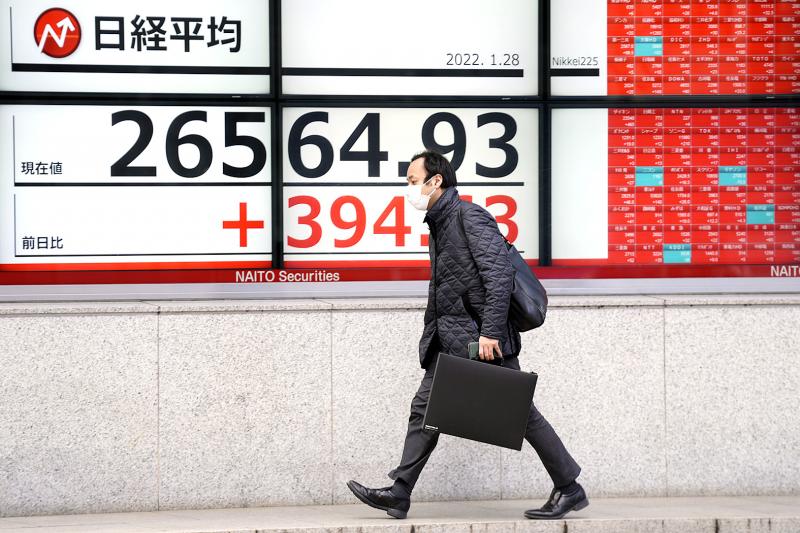Some Asian stocks rebounded on Friday after steep losses in the previous session as strong US economic growth and Apple Inc’s impressive earnings offset some bearishness generated by the US Federal Reserve’s hawkish comments.
US stock futures rose in Asia trade with NASDAQ futures up 0.77 percent and S&P 500 e-minis up 0.48 percent after Apple on Thursday reported record sales in the holiday quarter. Apple shares rose more than 5 percent in after-hours trading.
MSCI’s broadest index of Asia-Pacific shares outside Japan was up 0.4 percent after sliding 2.26 percent on Thursday. The index is still down 5.1 percent so far this month.

Photo: AP
“After [a] big sell-off earlier this week amid a hawkish stance by the Fed, we are seeing several markets in Asia recover from some of the heavy losses today,” said Zhang Zihua (張子華), chief investment officer at Beijing Yunyi Asset Management.
Tokyo’s benchmark Nikkei 225 rose 2.09 percent to 26,717.34, but lost 2.92 percent from a week earlier. Fuji Electric surged 9.68 percent to become the Nikkei’s biggest percentage gainer, after posting strong earnings late on Thursday.
The broader TOPIX gained 1.87 percent to 1,876.89, down 2.61 percent on the week.
Seoul’s KOSPI increased 1.87 percent to 2,663.34, losing 6.03 percent from a week earlier, while Sydney’s S&P/ASX 200 rose 2.19 percent to 6,988.1, down 2.62 percent on the week.
Hong Kong’s Hang Seng index fell on Friday, capping off its worst week since August last year amid global investor jitters sparked by rising expectations of monetary tightening by the Fed.
At the close of trade, the Hang Seng was down 56.92 points, or 1.08 percent, at 23,550.08. The index lost 5.67 percent on the week, its biggest weekly percentage drop in 23 weeks.
The Shanghai Composite Index declined 0.97 percent to 3,361.44, losing 4.57 percent from a week earlier.
India’s SENSEX dipped 0.13 percent to 57,200.23, posting a weekly decline of 3.11 percent.
In Taiwan, the equity market is closed until Sunday next week, because of the Lunar New Year holiday. It last closed down 26.72 points, or 0.15 percent, at 17,674.40 on Wednesday, with turnover of NT$224.109 billion (US$8.05 billion). It declined 1.16 percent from Friday last week.
Additional reporting by staff writer, with CNA

SELL-OFF: Investors expect tariff-driven volatility as the local boarse reopens today, while analysts say government support and solid fundamentals would steady sentiment Local investors are bracing for a sharp market downturn today as the nation’s financial markets resume trading following a two-day closure for national holidays before the weekend, with sentiment rattled by US President Donald Trump’s sweeping tariff announcement. Trump’s unveiling of new “reciprocal tariffs” on Wednesday triggered a sell-off in global markets, with the FTSE Taiwan Index Futures — a benchmark for Taiwanese equities traded in Singapore — tumbling 9.2 percent over the past two sessions. Meanwhile, the American depositary receipts (ADRs) of Taiwan Semiconductor Manufacturing Co (TSMC, 台積電), the most heavily weighted stock on the TAIEX, plunged 13.8 percent in

A wave of stop-loss selling and panic selling hit Taiwan's stock market at its opening today, with the weighted index plunging 2,086 points — a drop of more than 9.7 percent — marking the largest intraday point and percentage loss on record. The index bottomed out at 19,212.02, while futures were locked limit-down, with more than 1,000 stocks hitting their daily drop limit. Three heavyweight stocks — Taiwan Semiconductor Manufacturing Co (TSMC, 台積電), Hon Hai Precision Industry Co (Foxconn, 鴻海精密) and MediaTek (聯發科) — hit their limit-down prices as soon as the market opened, falling to NT$848 (US$25.54), NT$138.5 and NT$1,295 respectively. TSMC's

TARIFFS: The global ‘panic atmosphere remains strong,’ and foreign investors have continued to sell their holdings since the start of the year, the Ministry of Finance said The government yesterday authorized the activation of its NT$500 billion (US$15.15 billion) National Stabilization Fund (NSF) to prop up the local stock market after two days of sharp falls in reaction to US President Donald Trump’s new import tariffs. The Ministry of Finance said in a statement after the market close that the steering committee of the fund had been given the go-ahead to intervene in the market to bolster Taiwanese shares in a time of crisis. The fund has been authorized to use its assets “to carry out market stabilization tasks as appropriate to maintain the stability of Taiwan’s

In a small town in Paraguay, a showdown is brewing between traditional producers of yerba mate, a bitter herbal tea popular across South America, and miners of a shinier treasure: gold. A rush for the precious metal is pitting mate growers and indigenous groups against the expanding operations of small-scale miners who, until recently, were their neighbors, not nemeses. “They [the miners] have destroyed everything... The canals, springs, swamps,” said Vidal Britez, president of the Yerba Mate Producers’ Association of the town of Paso Yobai, about 210km east of capital Asuncion. “You can see the pollution from the dead fish.